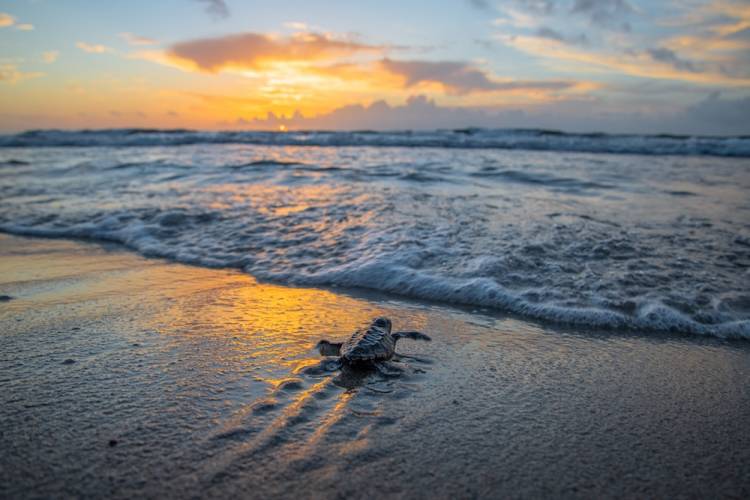Sea Turtle Nesting Season

The beaches of St. Augustine are officially open, and that means there are more than 40 miles of shoreline to explore. St. Augustine beaches are not only great for water sports and relaxing, they are also home to abundant wildlife. From May 1 through October 31, turtle nesting season takes place along Florida’s beaches, and there are a few things to keep in mind in order to protect these creatures. Here are a few things to keep in mind during your time here.
Don’t use flashlights at night.
Turtle hatchlings go toward the brightest light source, so artificial light can be detrimental to their survival. If you are in a beachside property, close your drapes and blinds at night and turn off any outdoor lighting.
Fill in sand holes and flatten sandcastles.
Sandcastles are fun to make, but they are obstacles for sea turtles. Sandcastles or holes in the sand can trap hatchlings on their way to the open water as well as female sea turtles who are looking for a place to nest.
Take all food and trash with you.
It’s always important to take with you what you brought to the beach. Pack up all food, trash, and belongings when you are leaving the beach to avoid littering as well as attracting animals to the beach.
Raccoons are known to kill sea turtles and will come to the beach if they smell food. Look behind you when you leave the beach to double-check you’re bringing everything back with you.
Avoid using fireworks on the beach.
Loud noises and bright lights will disturb nesting female turtles. Plus, anything more than a sparkler is illegal in the state of Florida.
Other Tips & Advice for Wildlife Viewing in St. Augustine
Program the Florida Wildlife Commission’s (FWC) Wildlife Alert Number (1-888-404-3922) into your phone. Use this phone number if you see an animal that needs assistance or if you see any type of turtle disturbance or harassment. Turtle are protected under the Federal Endangered Species Act of 1973 and Florida's Marine Turtle Protection Act (379.2431, Florida Statutes). Florida Statutes restrict the take, possession, disturbance, mutilation, destruction, selling, transference, molestation, and harassment of marine turtles, nests or eggs.
Touching a sea turtle is illegal. If you disturb a sea turtle, you can be penalized with up to one year in jail with fines up to $25,000. This law is taken very seriously because they are an endangered species.
